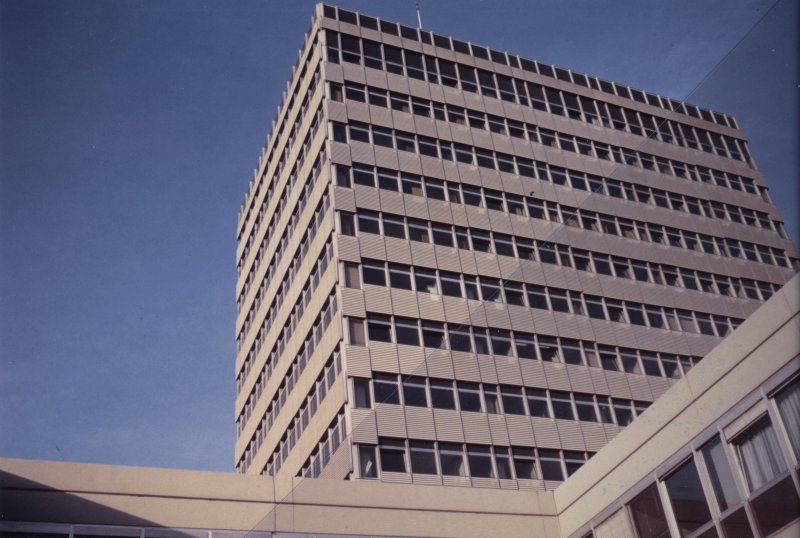History of the Institute for Theoretical Condensed Matter physics
The Institute for Theoretical Condensed Matter physics (TKM) was founded in 1970s. Prof. Albert Schmid of the University of Dortmund was appointed institute founder in 1976. He chose the name Institute for Theoretical Condensed Matter physics. The exploratory focus was:
- fluctuations and non-equilibrium processes in superconductors
- quantum corrections to electron transport
- interplay between disorder and interaction
- dissipative quantum mechanics and mesoscopic physics
The activity of the institute stood out due to intensive international collaborations with and exchange of scientists including, among others, John Bardeen, Michael Tinkham, John Clarke, Vinay Ambegaokar, Arkady Aronov, Lev Pitaevski, Anatoly Larkin, Yurii Ovchinikov, Vadim Gurevich and Alfred Zawadoski.
Albert Schmid's work was characterized by a deep understanding of physics, an admirable creativity and highly independent thinking. In 1993 Albert Schmid received the Fritz London Memorial Award.
Albert Schmid retired in 1994 and passed away on January 31st, 1998 at the age of 68.
Several students of Albert Schmid became professors themselves: Gerd Schön (Karlsruhe), Ulrich Eckern (Augsburg), Rainer Kree (Göttingen).
An additional group of the institute (Prof. R. v. Baltz) researched spin relaxation, optical properties and the photogalvanic effect in semiconductors. Prof. Ralph von Baltz retired in 2006. His designated successor was Prof. Matthias Vojta, who was active at the TKM from 2002 to 2006 and worked in the field of strongly correlated electron systems, in particular on topics like emergent order phenomena and quantum phase transitions.
In 1989 Prof. Peter Wölfle (then at the University of Florida, Gainesville, USA) was appointed successor of Prof. Schmid at the institute. He headed the institute from 1990 to his retirement in 2010. From the aforementioned fields of activity the following supervened:
- strongly correlated electron systems (high-Tc superconductivity, heavy fermion systems)
- unconventional superconductivity
- quantum transport in disordered systems with long-range order (fractional quantum hall effect)
- transport through nanostructures away from equilibrium
- quantum phase transitions
The intensive collaborations with international partners continued. Among others the following Humboldt laureats researched at the institute: Costas Soukoulis, Sajeev John, Yehoshua Levinson, Yuval Gefen, Ora Entin-Wohlman, Andrei Ruckenstein, Chandra Varma, John Chalker and Yoseph Imry.
Multiple students and postdoctoral fellows of Peter Wölfle from this time, have since become professors themselves: Thilo Kopp (Augsburg), Johann Kroha (Bonn), Raymond Frésard (Caen), Kurt Busch (Berlin), Achim Rosch (Cologne), Jens Paaske (Copenhagen), Ferdinand Evers (Regensburg), Ronny Thomale (Würzburg), Dirk Schuricht (Utrecht) and Stephan Rachel (Melbourne).
In addition, since 1998 Prof. Wölfle headed a department at the newly founded Institute of Nanotechnology (INT) at the Research Center Karlsruhe (now KIT, Campus North). His successor there is Prof. Alexander Mirlin, who stayed at the TKM from 1992 till 1998, starting out with a Humboldt scholarship, later on as research associate and finally switching to the INT. There, he has been department head since 2006 and since 2003 he has been associated as extraordinary professor with the TKM.
Since 2008, Prof. Matthias Vojta has a successor, Prof. Alexander Shnirman, who is researching the following topics:
- quantum state engineering in Josephson and spin systems
- microscopic decoherence sources in Josephson and spin qubits
- geometric phases and geometric pumping
- charge solitons in one-dimensional Josephson arrays
On June 1st, 2011, Prof. Jörg Schmalian (Iowa State University + US DOE Ames Laboratory, Ames, USA) has assumed his position as successor to Prof. Wölfle.
Symposia and workshops of the TKM
- Frontiers in physics of disordered and interacting quantum systems
(Workshop dedicated to Alexander Mirlin's 60th Birthday) - Electronic Correlations and Disorder in Quantum Matter (Workshop dedicated to Peter Wölfle's 70th Birthday)
- Quantum Transport in Electronic Nanosystems (Workshop in memory of Albert Schmid and Arkady Aronov)
- Strong Correlations and Disorder: Modern Aspects of Condensed Matter Theory (A Symposium on the Occasion of the 60th Birthday of Peter Wölfle)
- Albert Schmid Memorial Symposium

